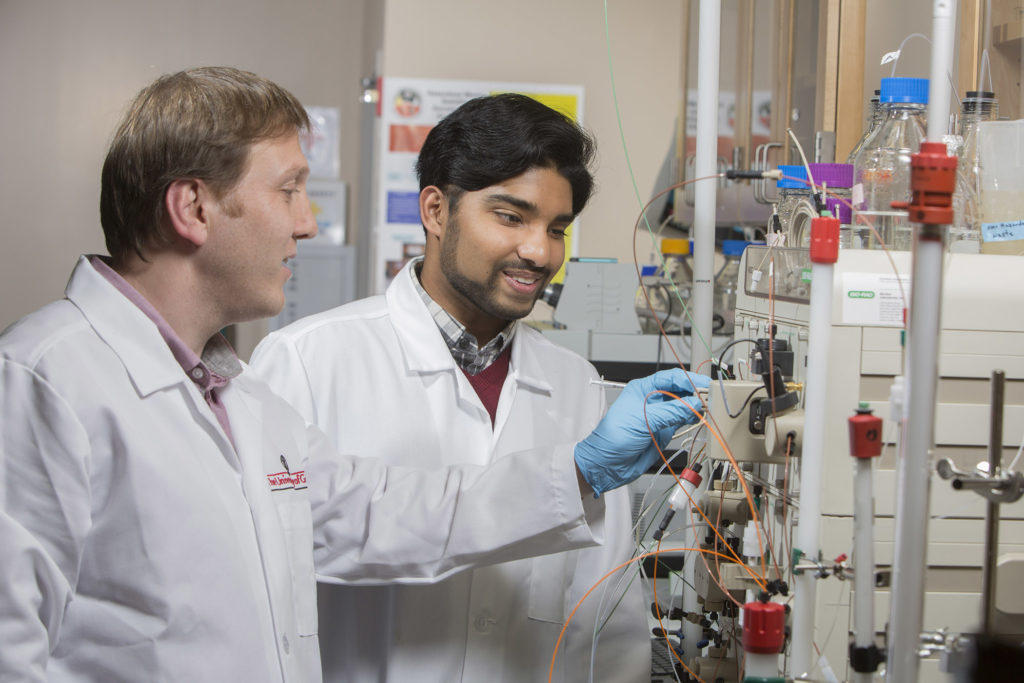Athens, Ga. – Participation in the University of Georgia’s annual undergraduate research symposium has reached a record, with more than 400 students presenting original research projects in fields ranging from art to pathology and computer science at the upcoming Center for Undergraduate Research Opportunities Symposium.
The CURO Symposium, scheduled for April 4 and 5 at the Classic Center in Athens, includes poster sessions and presentations, and is free and open to the public. Alan Darvill, Regents Professor of biochemistry and molecular biology and director of UGA’s Complex Carbohydrate Research Center, will present the keynote address April 4 at 3:30 p.m.
Senior Vice President for Academic Affairs and Provost Pamela Whitten said that UGA has made expanding undergraduate research opportunities a cornerstone of its initiative to ensure that each of its students engages in experiential learning prior to graduation.
“This year’s record CURO Symposium participation and the enthusiastic response to our expanded CURO Research Assistantship program underscore the intellectual curiosity of our students and their strong desire to apply their knowledge outside of the classroom,” she said.
CURO is administered by the Honors Program but expanded to become available to all undergraduates in 2010. For the first time, more than half the participants in this year’s symposium are from outside of the Honors Program.
In addition to $3,000 summer fellowship grants, which have been available for nearly a decade, students also can apply for the CURO Research Assistantship, which has provided $1,000 stipends to 250 undergraduates since 2014. The program will expand to 500 students next academic year.
“We greatly appreciate the very strong support that CURO receives from the central administration and from faculty members across campus,” said David S. Williams, associate provost and director of the Honors Program. “This allows students to participate in research at UGA for up to a full four years if they choose.”
Nikhil Gangasani is one of the 407 students participating in this year’s symposium. With ambitions of becoming a physician, he got involved in a CURO project within three months of arriving on campus as a freshman. In fact, he began conducting research in the biochemistry and molecular biology department before he had taken a biochemistry course.
“CURO provides a great opportunity for students to engage deeply in the subject matter that interests them,” said Gangasani, who is now a second-year student and will present his research that could lead to a vaccine for a particularly potent pneumococcal pathogen at the symposium.
“Knowledge I have gained from my research has already given me an advantage in classes like organic chemistry and biology. I am excited to see how what I have learned through my research will continue to apply to what I learn in the classroom, and vice versa.”
Martin Rogers, associate director of the Honors Program and CURO, said the benefits of the expanded CURO Research Assistantship at UGA can be witnessed not only in the quality of the research being completed by students but in the breadth of faculty-mentored research they are completing.
“No other research university offers such comprehensive support for such a variety of research endeavors, and it’s clear that such support prepares our students to be better leaders, innovators and scholars,” he said.
Students can pursue research in any field, as Melissa Cousins, a fourth-year student in the Lamar Dodd School of Art, learned.
“I’d been hoping to have an opportunity to do research since applying to UGA, but wasn’t sure how to incorporate research into my arts interests,” said Cousins, who received a CURO Summer Fellowship to delve into an enameling technique called plique-a-jour used in making jewelry. “I’m rather excited about introducing the idea of enameling to a wider audience. I hope that I will continue my research in the future to make enameling more accessible, efficient and high quality.”
The 2016 CURO Symposium, which is also sponsored by the Office of the President, the Office of the Senior Vice President for Academic Affairs and Provost, the Office of the Vice President for Research, the Office of the Vice President for Instruction and the UGA Alumni Association, will begin April 4 at 11:15 a.m. with concurrent oral sessions. The 3:30 p.m. keynote address by Darvill will be followed by a poster session where more than 200 projects will be featured. Awards will be presented for best paper, research and mentoring. The symposium will continue April 5 with concurrent oral sessions.
A UGA bus marked “Special” will provide transportation to the Classic Center, with stops at the Georgia Center, Tate Student Center and the Arch.
